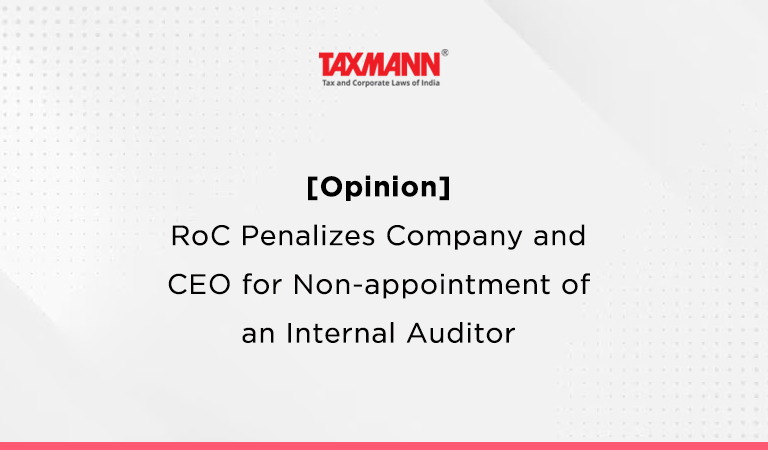[Opinion] RoC Penalizes Company and CEO for Non-appointment of an Internal Auditor
- Blog|News|Company Law|
- 3 Min Read
- By Taxmann
- |
- Last Updated on 16 April, 2023

Prof R Balakrishnan – [2023] 149 taxmann.com 226 (Article)
1. Internal Audit
As per the definition given by the Institute of Internal Auditors, USA, internal auditing is an independent, objective assurance and consulting activity designed to add value and improve an organization’s operations. It helps an organization accomplish its objectives by bringing a systematic, disciplined approach to evaluate and improve the effectiveness of risk management, control, and governance processes. Internal audit is performed by professionals with an in-depth understanding of the business culture, systems, and processes, the internal audit activity provides assurance that internal controls in place are adequate to mitigate the risks, governance processes are effective and efficient, and organizational goals and objectives are met.
1.1 Purpose of internal audit: The internal audit is done by checking whether the company has complied with all the applicable laws and thereafter a report is prepared by the Internal Auditor stating the compliances and material deviations if any. The internal auditor has to ensure that he should keep in mind the requirements with respect to internal audit as per the Companies Act, 2013.
2. Provisions under the Companies Act 2013 governing the Internal Audit
The Companies Act 2013 vide its section 138(1) has a provision stating that such class or classes of companies as may be prescribed shall be required to appoint an internal auditor, who shall either be a chartered accountant or a cost accountant, or such other professional as may be decided by the Board to conduct an internal audit of the functions and activities of the company. The relevant section is reproduced from the Companies Act for ready reference.
2.1 Section 138(1) of the Companies Act 2013 spells out that “Such class or classes of companies as may be prescribed shall be required to appoint an internal auditor, who shall either be a chartered accountant or a cost accountant, or such other professional as may be decided by the Board to conduct an internal audit of the functions and activities of the company.” Rule 13 of Companies (Accounts) Rules 2014, spells out the class of companies which are required to appoint an internal auditor.
The SEBI (Listing Obligation and Disclosure Requirements) Regulations 2015, which are monitored through stock exchanges by the Security Exchange Board of India for listed companies, has entrusted great responsibility to the audit committee. The committee is responsible to the board for overseeing management reporting on internal controls, and the auditor plays a significant role in assessing and risk management reporting based on the following pillars of corporate governance.
M/s. Indu Nissan Oxo Chemical Industries Limited being a listed entity is not only governed by the provisions of the Companies Act 2013 but also by LODR regulations.
3. Companies requiring to appoint an internal auditor
According to Rule 13 of The Companies (Accounts) Rules, 2014, the following class or classes of companies shall be required to appoint an internal auditor or firm of internal auditors, namely:
(a) every listed company;
(b) every unlisted public company having-
(i) paid up share capital of 50 crore rupees or more during the preceding financial year; or
(ii) turnover of 200 crore rupees or more during the preceding financial year; or
(iii) outstanding loans or borrowings from banks or public financial institutions exceeding 100crore rupees or more at any point of time during the preceding financial year; or
(iv) outstanding deposits of 25 crore rupees or more at any point of time during the preceding financial year; and
(c) every private company having-
(i) turnover of 200 crore rupees or more during the preceding financial year; or
(ii) outstanding loans or borrowings from banks or public financial institutions exceeding 100 crore rupees or more at any point of time during the preceding financial year.
Click Here To Read The Full Article
Disclaimer: The content/information published on the website is only for general information of the user and shall not be construed as legal advice. While the Taxmann has exercised reasonable efforts to ensure the veracity of information/content published, Taxmann shall be under no liability in any manner whatsoever for incorrect information, if any.

Taxmann Publications has a dedicated in-house Research & Editorial Team. This team consists of a team of Chartered Accountants, Company Secretaries, and Lawyers. This team works under the guidance and supervision of editor-in-chief Mr Rakesh Bhargava.
The Research and Editorial Team is responsible for developing reliable and accurate content for the readers. The team follows the six-sigma approach to achieve the benchmark of zero error in its publications and research platforms. The team ensures that the following publication guidelines are thoroughly followed while developing the content:
- The statutory material is obtained only from the authorized and reliable sources
- All the latest developments in the judicial and legislative fields are covered
- Prepare the analytical write-ups on current, controversial, and important issues to help the readers to understand the concept and its implications
- Every content published by Taxmann is complete, accurate and lucid
- All evidence-based statements are supported with proper reference to Section, Circular No., Notification No. or citations
- The golden rules of grammar, style and consistency are thoroughly followed
- Font and size that’s easy to read and remain consistent across all imprint and digital publications are applied



 CA | CS | CMA
CA | CS | CMA
